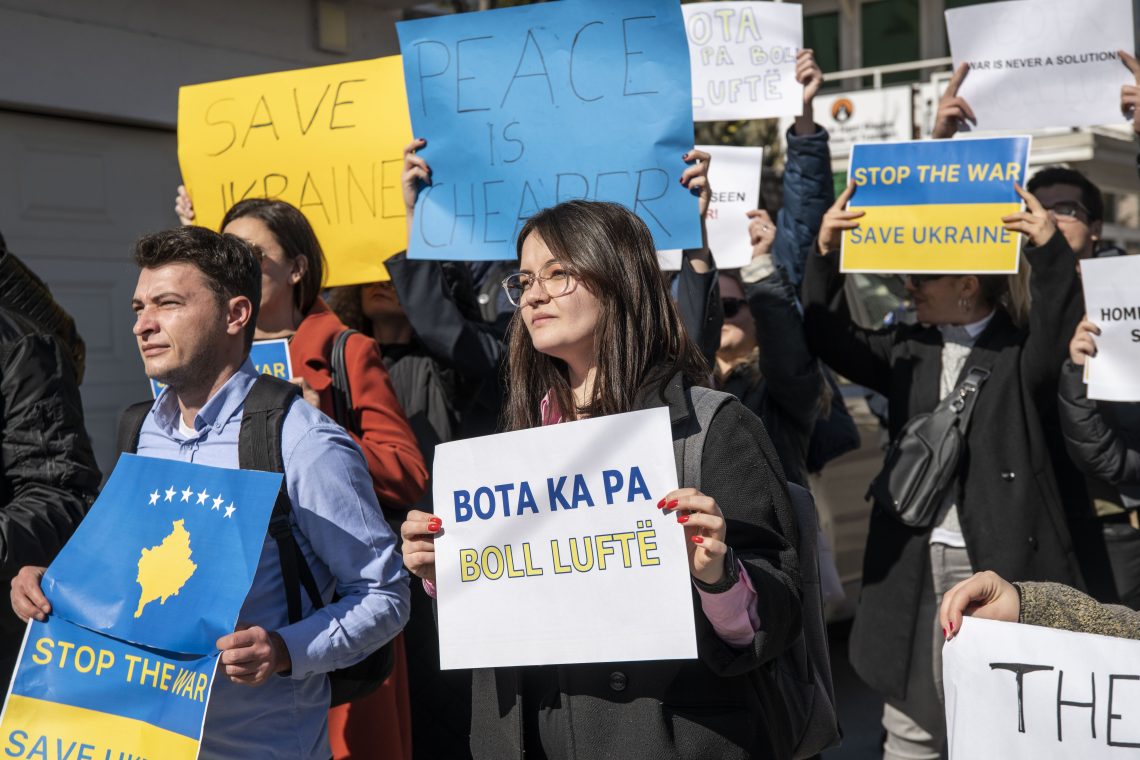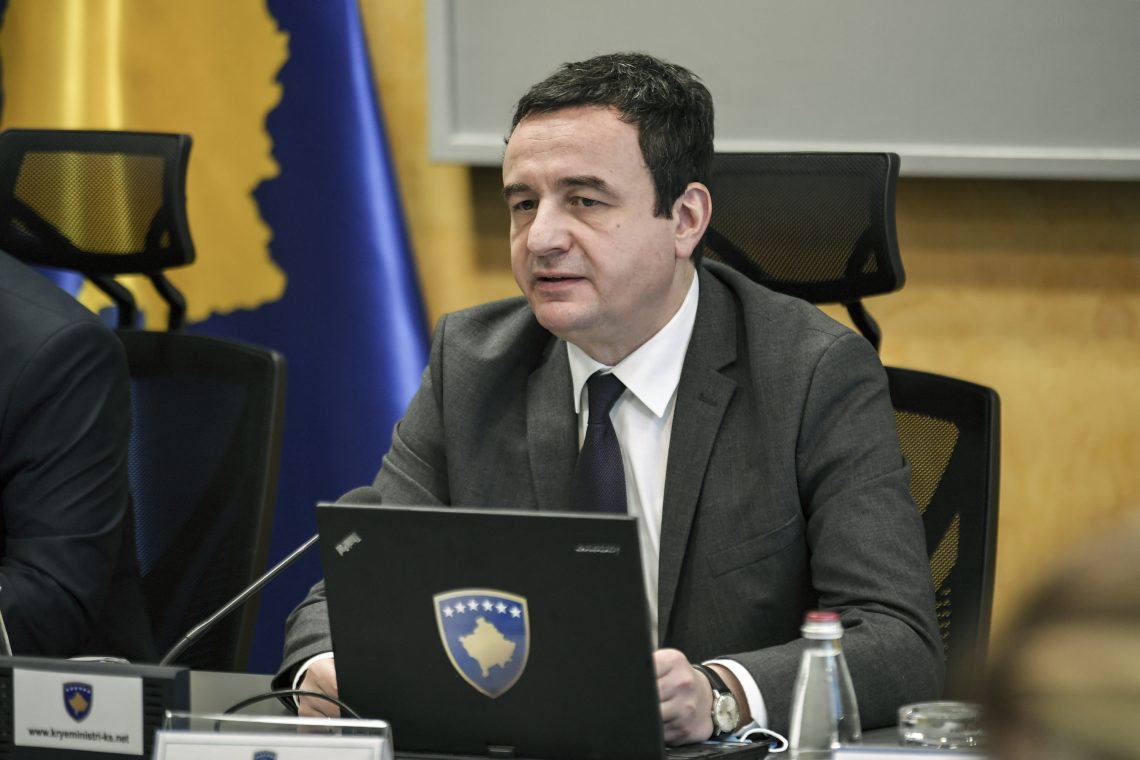Russia’s war further divides the Balkans
The war in Ukraine threatens to inflame tensions between pro-Russian and pro-Western Balkan nations. The EU and NATO need to be more active in the region to ensure security against potential Russian threats.

In a nutshell
- Tensions are rising in the Balkans over the Russia-Ukraine war
- Serbia is firmly pro-Russian
- Albania, Kosovo and North Macedonia are firmly pro-West
The Russian invasion of Ukraine is having major geopolitical consequences in the Balkans, deepening the region’s divide between pro-Russian and pro-Western camps. Serbia, with nearly 7 million people, continues to defend the Kremlin position. Bosnia and Herzegovina, with 3.3 million people, will not declare an official stand due to the veto power of Milorad Dodik, the Serbian representative of the tripartite federal presidency. Montenegro, with less than 1 million people, is trying to escape from Russian pressure and form a new pro-Western government, after the former pro-Serbian one failed.
Three other Balkan states – Albania, Kosovo and North Macedonia – are following the Euroatlantic line, condemning the Russian invasion of Ukraine and joining Western sanctions against Moscow. Together, these three nations have 7 million people.
The war has the potential to further destabilize the Balkans, but not if NATO and the European Union take a proactive approach. In such a scenario, the European Union would renew its willingness to add new members, while NATO would actively consider letting Kosovo join the alliance.
In the last two centuries, Russia has had three ruling regimes: tsarist, Soviet and postcommunist. But the same imperialistic mentality remains. For the Balkans, this means that President Vladimir Putin will likely continue to misuse the issue of Russian-speaking minorities abroad and activate Slavic-Orthodox communities, mainly through Serbia. To divert international attention from Ukraine, Kremlin-inspired provocations could take place in Bosnia and Herzegovina, Kosovo and Montenegro.
Albania’s voice at UN Security Council
Albania, currently the only Balkans member of the 15-member United Nations Security Council, initiated a February 25, 2022, resolution condemning the Russian invasion of Ukraine. It failed because of a Russian veto. China abstained. But in a special session of the UN General Assembly, 141 member states voted for a resolution condemning the Russian invasion of Ukraine, with five against and 34 in abstention.
Kosovo and North Macedonia had extraordinary meetings of their security councils, aligning their positions with the West. Their parliaments also adopted resolutions against the Russian invasion of Ukraine. The governments of Albania, Kosovo and North Macedonia condemned the Russian invasion, supported Ukraine’s sovereignty and territorial integrity, and joined in implementing sanctions against Russia. Their citizens protested outside Russian embassies.
The Kosovo Ministry of Defense asked for a permanent United States military base, offering its soldiers as support for NATO in Eastern Europe, and seeking NATO membership.
Although protests took place even in Russia, Serbs in Belgrade and Montenegro demonstrated in favor of President Putin.
Kosovo NATO membership
According to the North Atlantic Treaty of 1949, NATO’s founding document, a European state does not need to be a UN member to join the alliance. However, it should accept the principles of the treaty and contribute to Euroatlantic security (Article 10). Kosovo fulfills these conditions.
Kosovo’s accession to NATO would produce twin benefits: The alliance’s southern flank will be fortified, and NATO will protect Kosovo’s territorial integrity under the Article 5 mutual defense clause, even if it means that the NATO-led KFOR international peacekeeping base would be closed soon.
Kosovo membership in NATO is supported by Turkey and Croatia and U.S. Congress Representative Ritchie Torres, a New York Democrat who wrote to U.S. President Joe Biden in support of Kosovo’s aspirations. Additionally, the Kosovo government announced that it will apply for membership in the Council of Europe, after Russia’s suspension from the organization.
Kosovo will intensify its diplomatic activity toward joining NATO, the EU, and the Council of Europe. It has key support in achieving at least one of its goals. Germany supports Kosovo membership in the Council of Europe, according to Manuel Sarrazin, the German special envoy for the Western Balkans.
The Kosovo government also expects to achieve EU candidate status this year, with Croatian President Zoran Milanovic lending his support for EU candidacy to Kosovo and Bosnia and Herzegovina.
Russian influence
While Bosnia and Herzegovina are blocked from condemning Russia due to the veto power of Putin ally Milorad Dodik at the federal presidency, the situation is more complicated in Montenegro. Pro-Belgrade parties there did not allow the formation of a new pro-Western government, even though President Milo Dukanovic firmly stands with the West.
While Bosnia and Herzegovina are blocked from condemning Russia due to the veto power of Putin ally Milorad Dodik at the federal presidency, the situation is more complicated in Montenegro.
The strong link between the Serbian and Russian Orthodox Churches remains the key instrument of Russia’s influence in the region, with the Kremlin narrative spreading through Sputnik, the Russian government’s propaganda tool.
Russia has increased its influence not just in Serbia, Republika Srpska and Montenegro, but also in North Macedonia. The president of North Macedonia, Stevo Pendarovski, has raised concerns over strong support for Russia among ethnic Macedonians.
In Serbia, President Aleksandar Vucic ordered the military and the police to be prepared and continue investing in equipment and weapons, mainly from Russia, but also selling its arms to Myanmar. The Serbian Ministry of Defense declared that the army is in a state of readiness, while Serbia has started mobilizing reservists among Serbs in Kosovo, according to Kosovo’s deputy minister of defense.
Within a week, President Vucic convened two extraordinary national security meetings, declaring on February 25 that Serbia recognizes the territorial integrity of Ukraine, but will not join EU sanctions against Russia, further jeopardizing its prospects for EU accession.
The intelligence channel between Belgrade and Moscow is functioning well, as the scandal involving Serbian Interior Minister Aleksandar Vulin showed. Mr. Vulin gave the Kremlin transcripts from wiretapped meetings in Belgrade of Russian opposition leaders, leading to the arrest of Andrei Pivovarov, the former director of the Open Russia nongovernmental organization, in Moscow.
Mr. Vulin and Ivica Dacic, the speaker of the National Assembly of the Republic of Serbia, remain the two strongest supporters of the Kremlin. President Vucic says that 85 percent of Serbians will support Russian policies no matter what happens. He will use a pro-Russian narrative to mobilize voters for the upcoming presidential and parliamentary votes on April 3, as he seeks reelection.
On March 8, Ukrainian President Volodymyr Zelenskiy recalled 40 Ukrainian soldiers assigned to the KFOR peacekeeping mission so they could join the battle against Russia’s invasion.
Mr. Putin has also been obsessed with Kosovo, at least since Russia’s annexation of Crimea in 2014, when he tried to sell to the West a false “analogy” between Kosovo and Crimea. The two issues are, in fact, completely different. Kosovo declared its independence after being subjected to genocide and apartheid by Serbia. This is not the case in Crimea, where Ukraine never repressed the Russian population. Kosovo fought to liberate itself from Slobodan Milosevic’s brutal regime. Crimea, on the other hand, was occupied by a foreign country – Russia. On March 7, President Putin signed a decree that puts Albania, North Macedonia and Montenegro on a list of “unfriendly countries” together with the U.S., Canada, the United Kingdom and EU member states.

Concerned Balkans
International experts remained concerned about the violence from Russia’s war spilling over into the Balkans. Ivana Strander of the American Enterprise Institute has warned about a widening Kremlin proxy or hybrid war in which the Balkans “would be the next battle.” A year ago, she and another expert warned the West to stop giving President Putin a free pass in the Balkans and the Middle East.
The EU’s diplomatic chief, Josep Borrell, said that the 27-nation bloc is worried that the Russian military invasion could spread to Moldova, Georgia and the Western Balkans.
NATO Secretary-General Jens Stoltenberg, after an extraordinary meeting of the alliance on March 4, warned that, after Ukraine, Russia could threaten Georgia and Bosnia and Herzegovina.
The EU’s diplomatic chief, Josep Borrell, said that the 27-nation bloc is worried that the Russian military invasion could spread to Moldova, Georgia, and the Western Balkans. He visited the region from March 13-16, after warning that it is a target of Russian disinformation operations. The EU officially banned Kremlin-financed media outlets Russia Today and Sputnik on March 2, a measure joined by Kosovo and North Macedonia as well.
Russia’s interference in the region will likely increase, through its military-intelligence base in Serbia. The Kremlin playbook could include provoking incidents in Kosovo to “protect” the Serbian minority as it claimed to do with Russian-language speakers in eastern Ukraine. Kosovo Prime Minister Albin Kurti said that Russia’s invasion of Ukraine shows that “the Western Balkans is in even greater danger than the Baltic countries and Moldova, because there, Russia would have allocated part of its military strength.” German Foreign Minister Annalena Baerbock, in her first visit to the region, stated clearly that border changes will not be allowed in the Western Balkans.
Besides security risks, the Russian invasion also brings economic and migration consequences. More than 3 million Ukrainians have fled Russia’s bombardment, and up to 10 million refugees could eventually flee to neighboring countries, according to UN estimates. The majority went to Poland, but other European countries have also accepted significant numbers.
In the Balkans, the first wave of Ukrainian refugees arrived in Serbia, North Macedonia and Albania. North Macedonia declared that they would accept up to 10,000 refugees and Kosovo 5,000, starting with 20 Ukrainian journalists.
The Russian invasion in Ukraine will create economic problems too. Serbia has banned food export in anticipation of lower supplies because of the war. The other Balkan countries have introduced similar measures.
Scenarios
Russia’s invasion of Ukraine is the latest challenge to a post-Cold War order that was supposed to ensure that such wars of conquest in Europe no longer occurred. The consequences are being taken seriously in the Balkans.
The region already has an East-West split between the pro-Russian camp embodied by Serbia and Republika Srpska in Bosnia and Herzegovina, and the pro-Western countries of Albania, Kosovo and North Macedonia.
Montenegro, a NATO member with a pro-Western president, Milo Dukanovic, has a government crisis and a large pro-Russian Serbian community there. A minority government will likely be formed, but the country will go into new elections.
Also, new presidential elections in Serbia are scheduled for April 3, and their result will have an impact far beyond the country. President Vucic remains the favorite due to his absolute control of government and media. The West will likely advise him to remain resolutely on the Euroatlantic path, but he has been playing both sides. Expect the West to lose patience with this game and ask him to make a clear choice.
It is highly unlikely that Serbia will turn against Russia anytime soon, given the overwhelming popular support among Serbs, the strong links with the Russian Orthodox Church and economic dependence. More than half of its petrol industry is owned by Russian giants. Tellingly, Sputnik and other local media are financed by Russia. And two strong Kremlin allies have powerful positions in Serbia: Mr. Dacic, the parliament speaker, and Aleksandar Vulin in the government.
Russia will probably continue to spread its hybrid war against Western-oriented countries through Serbia, manipulating opinion with fake news and military propaganda, and using provocations in Bosnia and Herzegovina, Montenegro and Kosovo.
Republika Srpska earlier declared its aim to separate from the Federation of Bosnia and Herzegovina, and its leader, Milorad Dodik, could use the Russian invasion of Ukraine to realize that goal. It is not out of the question that Mr. Dodik will proclaim the independence of Republika Srpska and its 1.3 million people, following the example of Donetsk and Luhansk. Then it will ask for Russian “protection.” As a preventive step against this scenario, the EU sent an additional 500 troops to the EUFOR mission in Bosnia and Herzegovina.
Serbia is requesting that the same model of Republika Srpska be applied in Kosovo through “Zajednica” (also known as “the Association of Serbian Municipalities”), but the Constitutional Court of Kosovo declared it as unconstitutional. Nevertheless, Belgrade’s desire to push the issue is increasing tensions. The Kosovo Army and NATO mission in Kosovo will likely react promptly and will not allow larger destabilization. In neighboring Albania, U.S. special forces were deployed recently to prevent the destabilization of Kosovo and the Balkans. Due to these security threats, NATO might consider Kosovo membership in the alliance more seriously.
The EU will probably speed up accession negotiations with Albania and North Macedonia, with German Chancellor Olaf Scholz saying the EU should give a final answer to the region on integration. Mr. Borrell also signaled support, telling Radio Free Europe/Radio Liberty on March 14 that the accession process for both nations should be accelerated.
The likeliest scenario is that the EU’s united voice against the Russian invasion in Ukraine will reignite momentum for EU enlargement, ending two decades of stagnation in the Western Balkans. The cost of a geostrategic vacuum is too great, as President Putin’s war has shown. However, the Versailles Declaration, reached after an EU summit on March 11-12, notably did not promise to speed up enlargement talks, suggesting that Brussels still does not understand the regional security momentum.
The biggest post-Cold War EU enlargement took place in 2004. Now, in a situation that is similar to the Cold War, the time may be ripe to get serious about the accession of Balkan countries.








